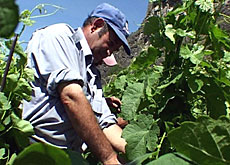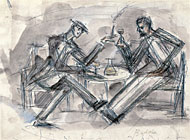Swiss winemakers pay tribute to Joyce

A leading Swiss wine producer has come up with a unique way of paying tribute to the Irish author, James Joyce, who spent part of his life in Zurich.
Sion-based Provins Valais launched its red and white “Cuvée James Joyce” in April, to coincide with celebrations in Ireland to mark the centenary of Joyce’s classic “Ulysses”.
On June 16, 1904, the book’s central characters – Stephen Dedalus and Leopold Bloom – each took their epic journeys through Dublin.
June 16 – or Bloomsday – has since become a celebration for Joyce enthusiasts all over the world.
Ulysses never allows the reader to forget Dublin, so Provins Valais targeted that city for the first dispatch of Cuvée James Joyce.
Export director Claude Dizerens told swissinfo the company is catering to a new breed of sophisticated drinkers, demanding more exotic products than whiskey and Guinness to satisfy their thirst.
Cuvée meets resistance
Cuvée James Joyce comprises Fendant de Sion, a fruity white wine grown from the Chasselas grapes covering the steeply terraced limestone hills of the lower Valais, and Dôle de Sion, made from a blend of Pinot Noir and Gamay grapes.
Each bottle costs about €11 (SFr17).
The idea was vetted and cleared by lawyers in Ireland before production started, to ensure that there was no breach of copyright.
This did not prevent the highly litigious lone administrator of the Joyce estate, the author’s grandson Stephen Joyce, from trying to put the cork back in the export plan.
After 18,000 bottles had already been sent off to the emerald isle, Joyce secured an injunction in the Swiss courts blocking further sales. Provins Valais entered a counter plea claiming damages.
The interim injunction was overturned at the beginning of June, leaving the author’s only surviving relative another 30 days to appeal.
No gimmick
Dizerens hit on the James Joyce theme because of the author’s strong links with Switzerland.
And he insists that the special label is not a cheap gimmick.
“We did not intend to dishonour the name of James Joyce or the names of his descendants,” he said.
“In fact, we hoped the product would encourage wine drinkers to take a closer look at Joyce’s enormous contribution to the literary world.”
Provins Valais only started exporting on a significant scale in 2001, and since then its exports have doubled.
It aims to send another 35,000 bottles of the special cuvée to Ireland, if Stephen Joyce does not try to throw another spanner in the works.
Joyce’s favourite tipple
Joyce wrote much of Ulysses and finished writing “Finnegans Wake” in Zurich before he died there in 1941.
Absinthe was his preferred tipple, but his wife persuaded him to give it up in favour of something less potent.
During one of his frequent wine tasting sessions in his Zurich front room, Joyce discovered Fendant de Sion, which he compared in his inimitable way to the urine of a noblewoman.
From then on, the wine became known as the “Archduchess”, and is celebrated as such in Finnegans Wake.
The author never became the connoisseur of wines that he fancied himself to be.
But he delighted in them and once said, “I’d like to have seven tongues and put them all [the wines] in my cheek at once”.
swissinfo, Julie Hunt
James Joyce first went to Zürich in 1904 to work as a teacher.
When the job fell through, he moved to Italy, before returning to Switzerland in 1915.
Between 1915 and 1919 he lived in Zurich and wrote the bulk of Ulysses.
Joyce died on January 13, 1941 in Zurich, and is buried there.
A leading Swiss wine producer is celebrating the centenary of James Joyce’s classic novel, Ulysses, with a special “Cuvée James Joyce”.
It’s been exported to Ireland for the Bloomsday celebrations in June.
But Joyce’s only surviving relative is trying to stop any further exports.

In compliance with the JTI standards
More: SWI swissinfo.ch certified by the Journalism Trust Initiative










You can find an overview of ongoing debates with our journalists here . Please join us!
If you want to start a conversation about a topic raised in this article or want to report factual errors, email us at english@swissinfo.ch.